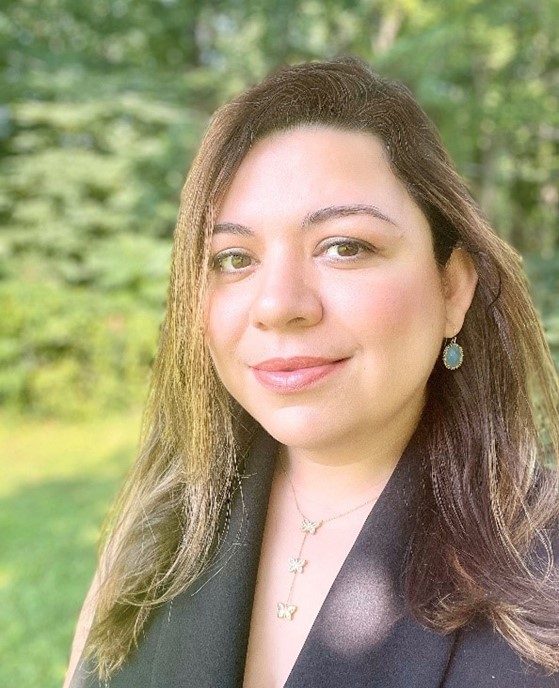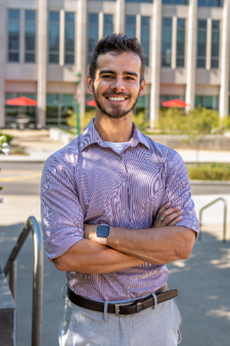Description of the video:
On the red tiles in my family's den
I would dance and sing to the made-for-TV movie "Gypsy,"
starring Bette Midler.
(Singing) "I had a dream.
A wonderful dream, papa."
I would sing it with the urgency and the burning desire of a nine-year-old
who did, in fact, have a dream.
My dream was to be an actress.
And it's true that I never saw anyone who looked like me
in television or in films,
and sure, my family and friends and teachers all constantly warned me
that people like me didn't make it in Hollywood.
But I was an American.
I had been taught to believe that anyone could achieve anything,
regardless of the color of their skin,
the fact that my parents immigrated from Honduras,
the fact that I had no money.
I didn't need my dream to be easy,
I just needed it to be possible.
And when I was 15,
I got my first professional audition.
It was a commercial for cable subscriptions
or bail bonds, I don't really remember.
(Laughter)
What I do remember is that the casting director asked me,
"Could you do that again, but just this time, sound more Latina."
"Um, OK.
So you want me to do it in Spanish?" I asked.
"No, no, do it in English, just sound Latina."
"Well, I am a Latina, so isn't this what a Latina sounds like?"
There was a long and awkward silence,
and then finally,
"OK, sweetie, never mind, thank you for coming in, bye!"
It took me most of the car ride home to realize that by "sound more Latina"
she was asking me to speak in broken English.
And I couldn't figure out why the fact
that I was an actual, real-life, authentic Latina
didn't really seem to matter.
Anyway, I didn't get the job.
I didn't get a lot of the jobs people were willing to see me for:
the gang-banger's girlfriend,
the sassy shoplifter,
pregnant chola number two.
(Laughter)
These were the kinds of roles that existed for someone like me.
Someone they looked at and saw as too brown, too fat,
too poor, too unsophisticated.
These roles were stereotypes
and couldn't have been further from my own reality
or from the roles I dreamt of playing.
I wanted to play people who were complex and multidimensional,
people who existed in the center of their own lives.
Not cardboard cutouts that stood in the background of someone else's.
But when I dared to say that to my manager --
that's the person I pay to help me find opportunity --
his response was,
"Someone has to tell that girl she has unrealistic expectations."
And he wasn't wrong.
I mean, I fired him, but he wasn't wrong.
(Laughter)
(Applause)
Because whenever I did try to get a role that wasn't a poorly written stereotype,
I would hear,
"We're not looking to cast this role diversely."
Or, "We love her, but she's too specifically ethnic."
Or, "Unfortunately, we already have one Latino in this movie."
I kept receiving the same message again and again and again.
That my identity was an obstacle I had to overcome.
And so I thought,
"Come at me, obstacle.
I'm an American. My name is America.
I trained my whole life for this, I'll just follow the playbook,
I'll work harder."
And so I did, I worked my hardest
to overcome all the things that people said were wrong with me.
I stayed out of the sun so that my skin wouldn't get too brown,
I straightened my curls into submission.
I constantly tried to lose weight,
I bought fancier and more expensive clothes.
All so that when people looked at me,
they wouldn't see a too fat, too brown, too poor Latina.
They would see what I was capable of.
And maybe they would give me a chance.
And in an ironic twist of fate,
when I finally did get a role that would make all my dreams come true,
it was a role that required me to be exactly who I was.
Ana in "Real Women Have Curves"
was a brown, poor, fat Latina.
I had never seen anyone like her, anyone like me,
existing in the center of her own life story.
I traveled throughout the US
and to multiple countries with this film
where people, regardless of their age, ethnicity, body type,
saw themselves in Ana.
A 17-year-old chubby Mexican American girl
struggling against cultural norms to fulfill her unlikely dream.
In spite of what I had been told my whole life,
I saw firsthand that people actually did want to see stories about people like me.
And that my unrealistic expectations
to see myself authentically represented in the culture
were other people’s expectations, too.
"Real Women Have Curves"
was a critical, cultural and financial success.
"Great," I thought, "We did it!
We proved our stories have value.
Things are going to change now."
But I watched as very little happened.
There was no watershed.
No one in the industry was rushing to tell more stories
about the audience that was hungry and willing to pay to see them.
Four years later, when I got to play Ugly Betty,
I saw the same phenomenon play out.
"Ugly Betty" premiered in the US to 16 million viewers
and was nominated for 11 Emmys in its first year.
(Applause)
But in spite of "Ugly Betty's" success,
there would not be another television show
led by a Latina actress
on American television for eight years.
It's been 12 years
since I became the first and only Latina
to ever win an Emmy in a lead category.
That is not a point of pride.
That is a point of deep frustration.
Not because awards prove our worth,
but because who we see thriving in the world
teaches us how to see ourselves,
how to think about our own value,
how to dream about our futures.
And anytime I begin to doubt that,
I remember that there was a little girl, living in the Swat Valley of Pakistan.
And somehow, she got her hands on some DVDs
of an American television show
in which she saw her own dream of becoming a writer reflected.
In her autobiography, Malala wrote,
"I had become interested in journalism
after seeing how my own words could make a difference
and also from watching the "Ugly Betty" DVDs
about life at an American magazine."
(Applause)
For 17 years of my career,
I have witnessed the power our voices have
when they can access presence in the culture.
I've seen it.
I've lived it, we've all seen it.
In entertainment, in politics,
in business, in social change.
We cannot deny it -- presence creates possibility.
But for the last 17 years,
I've also heard the same excuses
for why some of us can access presence in the culture
and some of us can't.
Our stories don't have an audience,
our experiences won't resonate in the mainstream,
our voices are too big a financial risk.
Just a few years ago, my agent called
to explain to me why I wasn't getting a role in a movie.
He said, "They loved you
and they really, really do want to cast diversely,
but the movie isn't financeable until they cast the white role first."
He delivered the message with a broken heart
and with a tone that communicated, "I understand how messed up this is."
But nonetheless, just like hundreds of times before,
I felt the tears roll down my face.
And the pang of rejection rise up in me
and then the voice of shame scolding me,
"You are a grown woman, stop crying over a job."
I went through this process for years of accepting the failure as my own
and then feeling deep shame that I couldn't overcome the obstacles.
But this time, I heard a new voice.
A voice that said, "I'm tired.
I've had enough."
A voice that understood
my tears and my pain were not about losing a job.
They were about what was actually being said about me.
What had been said about me my whole life
by executives and producers
and directors and writers and agents and managers
and teachers and friends and family.
That I was a person of less value.
I thought sunscreen and straightening irons
would bring about change in this deeply entrenched value system.
But what I realized in that moment
was that I was never actually asking the system to change.
I was asking it to let me in, and those aren't the same thing.
I couldn't change what a system believed about me,
while I believed what the system believed about me.
And I did.
I, like everyone around me,
believed that it wasn't possible for me to exist in my dream as I was.
And I went about trying to make myself invisible.
What this revealed to me was that it is possible
to be the person who genuinely wants to see change
while also being the person whose actions keep things the way they are.
And what it's led me to believe is that change isn't going to come
by identifying the good guys and the bad guys.
That conversation lets us all off the hook.
Because most of us are neither one of those.
Change will come
when each of us has the courage
to question our own fundamental values and beliefs.
And then see to it that our actions lead to our best intentions.
I am just one of millions of people
who have been told that in order to fulfill my dreams,
in order to contribute my talents to the world
I have to resist the truth of who I am.
I for one, am ready to stop resisting
and to start existing as my full and authentic self.
If I could go back and say anything
to that nine-year-old, dancing in the den, dreaming her dreams,
I would say,
my identity is not my obstacle.
My identity is my superpower.
Because the truth is,
I am what the world looks like.
You are what the world looks like.
Collectively, we are what the world actually looks like.
And in order for our systems to reflect that,
they don't have to create a new reality.
They just have to stop resisting the one we already live in.
Thank you.
(Applause)



